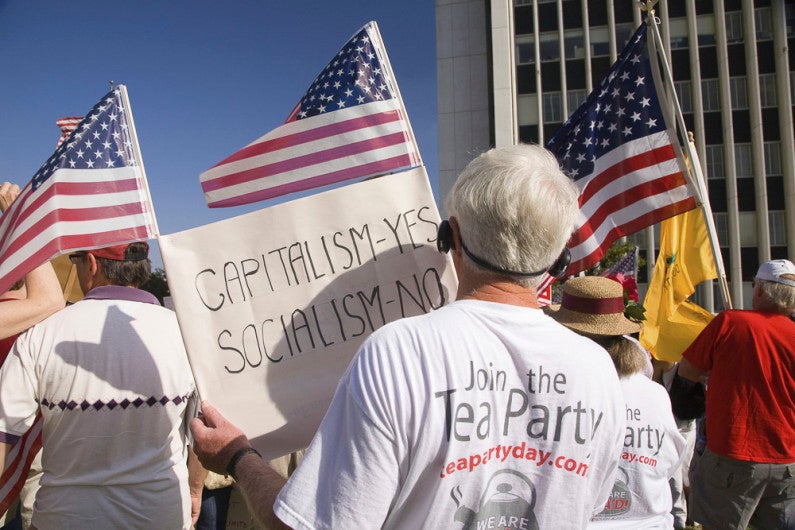Perceived threats to racial status drive white Americans’ Tea Party support, Stanford scholar says
In five experiments, Stanford sociologist Robb Willer found that popular support for the Tea Party derives in part from perceived threats to the status of whites in America.
Threats to racial status among white Americans have driven support for the Tea Party political movement and may also help explain the rise of Donald Trump, a Stanford sociologist said.
Since the Tea Party’s rise in 2009, academic experts have offered different explanations for its growth. The latest evidence from Stanford researchers shows that a perception of a “decline of whiteness” among some white Americans may be a key reason.

In a new study, Stanford sociologist Robb Willer found that popular support for the Tea Party derives in part from perceived threats to the status of whites in America. (Image credit: Joseph Sohm / Shutterstock)
For example, white people who were shown an artificially darkened picture of President Barack Obama were more likely to report they supported the Tea Party than if they were shown an artificially lightened version.
Robb Willer, a Stanford professor of sociology, writes in a new research paper that the election of Obama as the first non-white president converged with other economic and demographic trends around 2008 to spark the rise of the Tea Party. In short, these factors were perceived as threatening the relative “racial standing” of whites in the United States.
The Tea Party is an American political movement known for its conservative positions and role in the Republican Party. It is characterized by calls for reductions of the federal budget deficit, lower government spending, cuts to welfare programs, lower taxes and opposition to immigration.
Willer’s explanation of a perceived decline of whiteness differs from prior research in that it highlights the role of symbolic group status in generating a perceived threat from minority groups, rather than personal experience or economic competition. Willer studies the social psychology of political attitudes, including morality, the effects of fear, prejudice, and masculinity in contemporary U.S. politics. His co-authors on the study are Matthew Feinberg of the University of Toronto and Rachel Wetts of the University of California, Berkeley.
Their study, Willer said, is the first to demonstrate a causal link between Tea Party support and racial resentment.
Perception and racial status
Willer, Feinberg and Wetts conducted five survey-based, online experiments involving 1,329 participants. In one study they emphasized the president’s African American heritage by presenting participants with an artificially darkened picture of Barack Obama.
White participants shown the darkened photo were more likely to say they supported the Tea Party (22 percent) relative to a group shown a lightened photo of Obama (12 percent), according to the research.
In additional studies, the researchers told white participants that white share of the total U.S. population was decreasing or that whites’ average income relative to other ethnic groups was declining. In both cases, white participants showed greater support for the Tea Party. These effects were partly explained by heightened levels of racial resentment.
Another study involving strictly Tea Party supporters also found increased Tea Party support when the declining portion of whites in America was emphasized.
Finally, the fifth study showed that the white participants who perceived threats to their racial status reported stronger support for the Tea Party when aspects of its platform that could have racial implications (opposition to immigration, welfare) were emphasized, than if libertarian ones (reduced government spending) were.
Willer and his colleagues concluded that white Americans who believe their racial status is threatened view the Tea Party more positively due to its embrace of issues associated with racial resentment.
Great Recession, Obama election
In recent years, some white Americans have come to see their standing in the racial hierarchy as precarious, Willer said.
“Past work finds that economic downturns can exacerbate racial resentment by giving whites’ the sense that they have a shrinking piece of a shrinking pie,” he said.
The series of trends and events began with the election of President Obama in 2008, the Great Recession and the rising political influence of minorities in America, Willer said.
“Together these factors could be viewed as a collective threat to the status of whiteness in the U.S., which provided fertile ground for the rise of a social movement that promoted a return to the way things used to be in America, including a set of policies that could restore whites’ position on top in the racial status hierarchy,” he said.
Trump and the 2016 election
In an interview, Willer said many of these same dynamics may be at play in the emergence of Donald Trump as the presumptive Republican nominee for president.
“Donald Trump’s candidacy pulls support from much of the same base that the Tea Party did and has. And there is good reason to think that many of the same psychological forces propelling Tea Party support also propel support for Trump’s candidacy. Indeed, Trump’s statements probably go further in criticizing minority groups than the Tea Party did,” he said.
Willer said their research suggests that racial status threats led whites to support the Tea Party because they viewed it as advocating for a variety of policies – restrictions on immigration, opposition to Obama, militant positions toward Muslim nations – that would help restore the standing of whites in America.
“What was largely implicit in the case of the Tea Party has become more explicit in the case of Trump’s candidacy,” Willer said.
